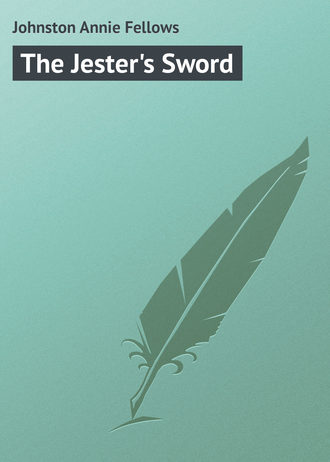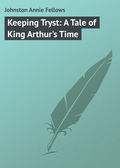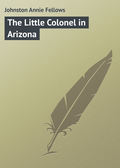
Johnston Annie Fellows
The Jester's Sword
"Surely thy lot is hard, good brother," he said, looking curiously into the wrinkled face. "Humbling thy pride to beg at every door, forswearing thine own good in every way that others may be fed, and yet thy face speaks an inward joy. I pray thee tell me how thou hast found happiness."
"By never going in its quest," the friar answered. "Long years ago I learned a lesson from the stars. Our holy Abbot took me out one night into the quiet cloister, and pointing to the glittering heavens showed me my duty in a way I never have forgot. I had grown restive in my lot and chafed against its narrow round of cell and cloister. But in a word he made me see that if I stepped aside from that appointed path, merely for mine own pleasure, 'twould mar the order of God's universe as surely as if a planet swerved from its eternal course.
"'No shining lot is thine,' he said. 'Yet neither have the stars themselves a light. They but reflect the Central Sun. And so mayst thou, while swinging onward, faithful to thy orbit, reflect the light of heaven upon thy fellow men.'
"Since then I've had no need to go a-seeking happiness, for bearing cheer to others keeps my own heart a-shine.
"I pass the lesson on to thee, good friend. Remember, men need laughter sometimes more than food, and if thou hast no cheer thyself to spare, why, thou mayst go a-gathering it from door to door as I do crusts, and carry it to those who need."
Long after the good friar had supped and gone, Aldebaran sat in silence. Then crossing to the tiny casement that gave upon the street, he stood and gazed up at the stars. Long, long he mused, fitting the friar's lesson to his own soul's need, and when he turned away, the old astrologer's prophecy had taken on new meaning.
"As Aldebaran the star shines in the heavens" (no light within itself, but borrowing from the Central Sun), "so Aldebaran the man might shine among his fellows." (Beggared of joy himself, yet flashing its reflection athwart the lives of others.)
When next he went into the town he no longer shunned the sights that formerly he'd passed with face averted, for well he knew that if he would shed joy and hope on others he must go to places where they most abound. What matter that the thought of Vesta stabbed him nigh to madness when he looked on hearth-fires that could never blaze for him? With courage almost more than human he put that fond ambition out of mind as if it were another sword he'd learned to sheathe. At first it would not stay in hiding, but flew the scabbard of his will to thrust him sore as often as he put it from him. But after awhile he found a way to bind it fast, and when he'd found that way it gave him victory over all.
A little child came crying towards him in the marketplace, its world a waste of woe because the toy it cherished had been broken in its play. Aldebaran would have turned aside on yesterday to press the barbed thought still deeper in his heart that he had been denied the joy of fatherhood. But now he stooped as gently as if he were the child's own sire to wipe its tears and soothe its sobs. And when with skilful fingers he restored the toy, the child bestowed on him a warm caress out of its boundless store.
He passed on with his pulses strangely stirred. 'Twas but a crumb of love the child had given, yet, as Aldebaran held it in his heart, behold a miracle! It grew full-loaf, and he would fain divide it with all hungering souls! So when a stone's throw farther on he met a man well-nigh distraught from many losses, he did not say in bitterness as once he would have done, that 'twas the common lot of mortals; to look on him if one would know the worst that Fate can do. Nay, rather did he speak so bravely of what might still be wrung from life though one were maimed like he, that hope sprang up within his hearer and sent him on his way with face a-shine.
That grateful smile was like a revelation to Aldebaran, showing him he had indeed the power belonging to the stars. Beggared of joy, no light within himself, yet from the Central Sun could he reflect the hope and cheer that made him as the eye of Taurus 'mong his fellows.
The weeks slipped into months, months into years. The Jester went his way unto his kindred and never once was missed, because Aldebaran more than filled his place. In time the town forgot it ever had another Jester, and in time Aldebaran began to feel the gladness that he only feigned before.
And then it came to pass, whenever he went by, men felt a strange, strength-giving influence radiating from his presence, – a sense of hope. One could not say exactly what it was, it was so fleeting, so intangible, like warmth that circles from a brazier, or perfume that is wafted from an unseen rose.
Thus he came down to death at last, and there was dole in all the Province, so that pilgrims, journeying through that way, asked when they heard his passing-bell, "What king is dead, that all thus do him reverence?"
"'Tis but our Jester," one replied. "A poor maimed creature in his outward seeming, and yet so blithely did he bear his lot, it seemed a kingly spirit dwelt among us, and earth is poorer for his going."
All in his motley, since he'd willed it so, they laid him on his bier to bear him back again unto his father's house. And when they found the Sword of Conquest hidden underneath his mantle, they marvelled he had carried such a treasure with him through the years, all unbeknown even to those who walked the closest at his side.







